Heart attack
A heart attack may cause tingling and numbness in one hand. If a person is experiencing a suspected heart attack, they or someone near them should seek emergency medical help.
Severe blockages in the heart's main blood supply can cause chest pain as well as tingling and numbness down one arm or the other.
Stroke
An interruption in the blood flow to the brain — potentially from a traveling blood clot or a ruptured artery causing a brain bleed — can lead to stroke. Symptoms may include: sudden weakness or numbness on one side of the body; confusion; lower facial drooping on one side of the face; difficulty maintaining balance; visual problems; speech problems.
Vasculitis
Vasculitis can occur when the immune system attacks itself and causes inflammation of the blood vessels. Symptoms vary based on the area of the body the vasculitis affects. Some may include nerve problems, such as numbness or weakness.
Raynaud's disease
Raynaud's disease causes the arteries that direct blood to the fingers and toes to temporarily narrow. Symptoms may include a numb, tingling, or burning feeling in fingers, as well as the fingers and toes turning blue or pale white.
Brachial plexus injury
The brachial plexus is a complex network of nerves that extend from the spine to each shoulder. This network transmits signals between the spine and the shoulders, arms, and hands. Shoulder injuries, tumors, and other causes of inflammation can all lead to damage in the brachial plexus, which can result in numbness in a person's hand.
Infants may experience brachial plexus injuries during birth due to excessive shoulder stretching in the birth canal. Symptoms can include: severe shoulder or arm pain; numbness in the hands; weakness and difficulty moving the arms.
Fibromyalgia
This condition affects nerve function and causes chronic pain, which may result in tingling and numbness that may closely resemble that of carpal tunnel syndrome (CTS).
Spinal cord injury
Trauma due to a spinal cord injury can lead to tingling and numbness in the hands and feet. Falls, motor vehicle accidents, blows to the head, gunshot wounds, and several other events can all cause spinal cord injuries.
Cubital tunnel syndrome
This condition results from excessive stretching or pressure on the ulnar nerve. Symptoms, specifically in the ring and pinky fingers, may include numbness; weakness; tingling.
Cervical spondylosis
Cervical spondylosis is also known as osteoarthritis of the neck. This condition occurs when degeneration affects the disks or joints in the neck. Symptoms may include: muscle weakness in the extremities; pain in the hands; increased urinary urgency, frequency, or hesitancy; gait disturbance.
Carpal tunnel syndrome
CTS affects around one percent of people who are of working age. CTS occurs when one of the nerves that runs through the carpal tunnel in the wrist becomes compressed.
Source: www.medicalnewstoday.com


